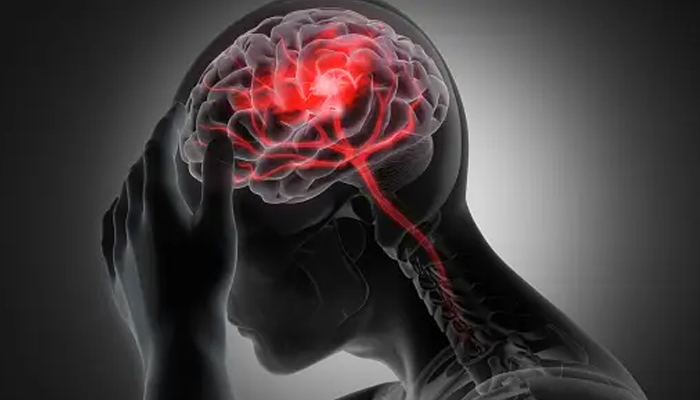‘Stroke cases rising due to hypertension, smoking and air pollution’
The incidence of stroke has been increasing in Pakistan due to uncontrolled hypertension, smoking and air pollution, health experts said on Saturday as they expressed concern over younger people suffering from large strokes in the country.
Speaking at an awareness session organised by the Aga Khan University (AKU) in connection with World Stroke Day 2023, the experts said that around 400 people were dying daily due to stroke in Pakistan and around 1,000 were paralysed every day because of stroke, which is largely a preventable disease.
Renowned neurologist Prof Mohammad Wasay from the AKU called for establishing a national task force for stroke and other non-communicable diseases to address the issue.
"More than 70 per cent deaths in Pakistan are related to non-communicable diseases. An estimated more than 400 persons, mostly women, die of stroke daily in Pakistan,” he said and appreciated the Punjab government for establishing a provincial stroke management centre. He urged other provincial governments to follow suit.
He said stroke was preventable and stroke-related deaths and disabilities could be reduced by immediate proper action by health authorities. Dr Salman Farooq from the National Institute of Cardiovascular Diseases (NICVD) presented the stroke data from the AKU and NICVD showing a remarkably high burden of multiple risk factors in stroke patients.
Dr Bisma Aziz from the AKU presented her research paper on the use of hypertonic saline and osmotherapy in stroke patients. Dr Bushra Taimoori from the Liaquat College of Medicine and Dentistry highlighted the role of air pollution as a stroke risk factor.
"More than 30 per cent stroke and 40 per cent disability due to stroke are related to air pollution,” she maintained. Another neurologist Dr Shahid Mustafa highlighted the value of early detection of atrial fibrillation and aggressive treatment for stroke prevention in elderly population.
The president-elect of the Pakistan Stroke Society, Dr Abdul Malik, in his talk highlighted the activities of the society for improving stroke care in Pakistan, including holding screening camps, organising World Stroke Day programmes, and training nurses and ambulance staff all over Pakistan, especially Sindh.
Dr Ayesha Zafar, the outgoing president of the Pakistan Stroke Society from the Lady Reading Hospital Peshawar called for establishing stroke units at all public hospitals, making thrombolytic treatment available at public hospitals and starting thrombectomy services across all the country.
-
 Nicole Kidman Celebrates Galentine’s Day Months After Keith Urban Split
Nicole Kidman Celebrates Galentine’s Day Months After Keith Urban Split -
 Justin Bieber Unveils Hailey Bieber As First Face Of SKYLRK In Intimate Campaign Debut
Justin Bieber Unveils Hailey Bieber As First Face Of SKYLRK In Intimate Campaign Debut -
 Caitlin O’Connor Says Fiance Joe Manganiello Has Changed Valentine’s Day For Her
Caitlin O’Connor Says Fiance Joe Manganiello Has Changed Valentine’s Day For Her -
 Rachel Zoe Sends Out Message For Womne With Her Post-divorce Diamond Ring
Rachel Zoe Sends Out Message For Womne With Her Post-divorce Diamond Ring -
 James Van Der Beek's Final Conversation With Director Roger Avary Laid Bare: 'We Cried'
James Van Der Beek's Final Conversation With Director Roger Avary Laid Bare: 'We Cried' -
 Jaden Smith Walks Out Of Interview After Kanye West Question At Film Premiere
Jaden Smith Walks Out Of Interview After Kanye West Question At Film Premiere -
 Why Halle Berry Wasn't Ready For Marriage After Van Hunt Popped Question? Source
Why Halle Berry Wasn't Ready For Marriage After Van Hunt Popped Question? Source -
 Michelle Obama Gets Candid About Spontaneous Decision At Piercings Tattoo
Michelle Obama Gets Candid About Spontaneous Decision At Piercings Tattoo -
 Bunnie Xo Shares Raw Confession After Year-long IVF Struggle
Bunnie Xo Shares Raw Confession After Year-long IVF Struggle -
 Brooks Nader Reveals Why She Quit Fillers After Years
Brooks Nader Reveals Why She Quit Fillers After Years -
 Travis Kelce Plays Key Role In Taylor Swift's 'Opalite' Remix
Travis Kelce Plays Key Role In Taylor Swift's 'Opalite' Remix -
 How Jennifer Aniston's 57th Birthday Went With Boyfriend Jim Curtis
How Jennifer Aniston's 57th Birthday Went With Boyfriend Jim Curtis -
 JoJo Siwa Shares Inspiring Words With Young Changemakers
JoJo Siwa Shares Inspiring Words With Young Changemakers -
 James Van Der Beek Loved Ones Breaks Silence After Fundraiser Hits $2.2M
James Van Der Beek Loved Ones Breaks Silence After Fundraiser Hits $2.2M -
 Disney’s $336m 'Snow White' Remake Ends With $170m Box Office Loss: Report
Disney’s $336m 'Snow White' Remake Ends With $170m Box Office Loss: Report -
 Travis Kelce's Mom Donna Kelce Breaks Silence On His Retirement Plans
Travis Kelce's Mom Donna Kelce Breaks Silence On His Retirement Plans




